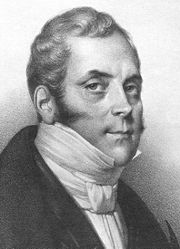
- Born: Caen, France, 29 January 1782
- Died: Paris, France, 12 May 1871
Auber (1782-1871) is little known today, but was once one of the most popular composers in Europe. Tom Kaufman, for one, considered him one of the three giants of French opera in the mid-19th century, alongside Meyerbeer and Halévy.
While I wouldn’t put Auber quite in the top rank, his operas are delightful entertainment. The music is “light”, but it’s always clear, tuneful, charming, and never less than pleasing.
Perhaps that’s why Rossini called the diminutive composer Piccolo musico, ma grande musicista (“a small musician, but a great maker of music”).
Wagner, no less, was a big fan.
His music – at once elegant and popular, effortless and precise, graceful and robust, and letting its whimsy take it where it would – had all the necessary qualities to capture and dominate the public’s taste. He seized song with a witty vivacity, multiplied rhythms to infinity, and gave ensembles a characteristic zest and freshness almost unknown before him.
And the young Richard raved about La muette de Portici (1828), a historical epic about the Neapolitan fisherman Masaniello’s revolt against Habsburg Spain in 1647:
It is a national work of the sort that each nation has only one of at the most… This tempestuous energy, this ocean of emotions and passion, depicted most vividly and shot through with the most individual melodies, compounded of grace and power, charm and heroism – is not all this the true incarnation of the French nation’s recent history? Could this astonishing work of art have been created by any composer other than a Frenchman? – It cannot be put any other way – with this work the modern French school reached its highest point, winning with it mastery over the whole civilised world.
Such a vivid operatic subject was a complete novelty – the first real drama in five acts with all the attributes of a genuine tragedy, down to the actual tragic ending… Each of these five acts presented a drastic picture of the greatest vivacity, in which arias and duets in the conventional operatic sense were scarcely to be detected any more, or at least – with the exception of the prima donna’s aria in the first act – no longer had this effect. Now it was the entire act, as a larger ensemble, that gripped one and carried one away.
That opera was revolutionary in more ways than one. It inspired Wagner’s music dramas – and was the spark for the creation of Belgium.
Auber’s opéras comiques – many written in collaboration with top librettist Eugène Scribe (after whom, of course, this blog is named) – influenced Gilbert & Sullivan, Offenbach, and Viennese opera.
They include:
- Fra Diavolo (1830), about a romantic Italian bandit
- Le cheval de bronze (1835), a fantastical tale set in ancient China and on the planet Venus (before scientists discovered the planet is 462 °C, and has an atmosphere of poisonous carbon dioxide gas and sulphuric acid)
- Le domino noir (1837), in which a young Spaniard falls in love with a nun
Only nine of his nearly 50 operas have been performed in recent decades. Les diamants de la couronne (1841), Haydée (1847), and Manon Lescaut (1856) have also been produced at Compiègne. La sirène (1844) was performed in early 2018, and after the warmly received Domino noir in Paris in 2018, hopefully more will follow.
And the overtures are exhilarating.
The best book in English on the composer is Robert Letellier’s Daniel-François-Esprit Auber: The Man and His Music (2010).
Operas
- Julie (L’ erreur d’un moment) (1805)
- Jean de Couvain (1812)
- Le séjour militaire (1813)
- Le testament et les billets doux (1819)
- La bergère châtelaine (1820)
- Emma, ou La promesse imprudente (1821)
- Leicester, ou Le château de Kenilworth (1823)
- La neige, ou Le nouvel Eginhard (1823)
- Vendôme en Espagne (1823, written in collaboration with Herold)
- Les trois genres (1824, written in collaboration with Boieldieu)
- Le concert à la cour, ou La débutante (1824)
- Léocadie (1824)
- Le maçon (1825)
- Le timide, ou Le nouveau séducteur (1826)
- Fiorella (1826)
- La muette de Portici (Masaniello) (1828) ***+
- La fiancée (1829)
- Fra Diavolo, ou L’hôtellerie de Terracine (1830) ****
- Le dieu et la bayadère, ou La courtisane amoureuse (1830)
- Le Philtre (1831)
- La marquise de Brinvilliers (1831, written in collaboration with Batton, Berton, Blangini, Boieldieu, Carafa, Cherubini, Herold, and Paer)
- Le serment, ou Les faux-monnayeurs (1832)
- Gustave III, ou Le bal masqué (1833) *****
- Lestocq, ou L’intrigue et l’amour (1834)
- Le cheval de bronze (1835) ***
- Actéon (1836)
- Les chaperons blancs (1836)
- L’ambassadrice (1836)
- La fête de Versailles (1837)
- Le domino noir (1837) ****
- Le lac des fées (1839)
- Zanetta, ou Jouer avec le feu (1840)
- Les diamants de la couronne (1841) ***
- Le duc d’Olonne (1842)
- La part du diable (1843)
- La sirène (1844)
- La barcarolle, ou L’amour et la musique (1845)
- Les premiers pas (1847, written in collaboration with Adam, Carafa, and Halévy)
- Haÿdée, ou Le secret (1847) ***+
- L’enfant prodigue (1850)
- Zerline, ou La corbeille d’oranges (1851)
- Marco Spada (1852)
- Jenny Bell (1855)
- Manon Lescaut (1856) ***
- La circassienne (1861)
- La fiancée du roi de Garbe (1864)
- Le premier jour de bonheur (1868)
- Rêve d’amour (1869)